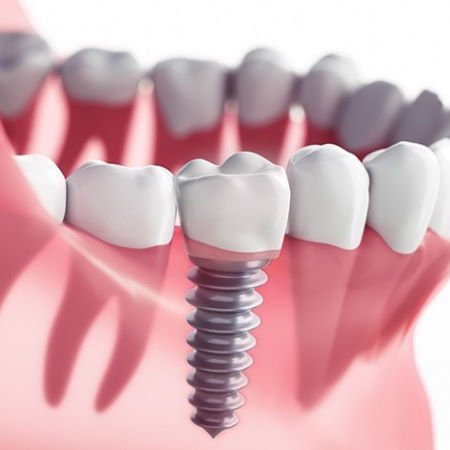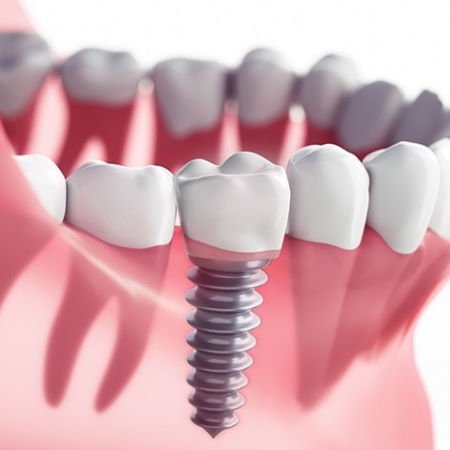If you’ve been exploring teeth replacement options, there’s no doubt you’ve heard about dental implants. With a success rate of over 95 percent, implants are considered the longest-lasting, most reliable teeth replacement solution. But do they need to be replaced? And if so, how often? Our team at Kreeb Family Dental is here to answer these questions so you can make an informed decision.
Before we explore the lifespan of a dental implant, let’s take a look at how an implant works. There are three primary components:
It’s important to note that the abutment and crown are generally more vulnerable to damage than the implant itself.

When maintained with proper hygiene and checkups, dental implants can last a lifetime. The crown attached to the implant will generally need replaced every 15 to 20 years, although they can last for several decades in some cases. Compared to other teeth replacement options, dental implants are the most cost-effective treatment overall. While they may cost more upfront, they last much longer than bridges and dentures, saving you a tremendous amount of time, worry, and money in the future.
Fortunately, maintaining implants doesn’t usually require any more care than your natural teeth. That being said, here are some tips and tricks to help keep your implant in optimal condition:
Implants are long-lasting and reliable when placed correctly. But there are certain risk factors that can cause an implant to fail:
If you’re considering implants as a teeth replacement option, schedule a consultation at our practice to learn more. You can call us at 704-875-7200 or contact us online anytime.
If a tooth becomes infected, there are two possible treatment options: root canal therapy and extraction. When a tooth is removed, it should be replaced to preserve optimal oral health. A dental implant can replace a tooth that was removed due to decay, infection, or damage. But how can you know which treatment option is right for you?
At Kreeb Family Dentistry, Drs. Bryan and Kelly Kreeb offer both restorative procedures. In this article, we’ll briefly explore each treatment option and discuss the pros and cons of each.
The purpose of root canal therapy is to remove the infected tissues inside the tooth. To do this, special endodontic instruments are used to access the internal tooth structure. After carefully removing the nerves and pulp, the root canals are thoroughly cleaned and disinfected.
Next, the canals are filled with a restorative material called gutta percha, and the tooth is sealed with a composite resin filling. In many cases, a dental crown is added for optimal strength.
Root canal therapy offers several advantages for patients with infected teeth. For example:

To qualify for root canal therapy, you must have sufficient remaining tooth structure. If the tooth is too broken down, the procedure won’t be feasible. Furthermore, root canal therapy can fail, especially if it is performed on a tooth with a poor prognosis.
However, if you are in good oral health otherwise and the affected tooth has a good prognosis, root canal therapy could be an excellent solution. During a consultation at our practice, we can help you weigh the pros and cons of this treatment option.
Dental implants are small threaded posts made from surgical-grade titanium. Currently deemed as the most successful teeth replacement option, implants can last a lifetime with proper care.
Generally, it takes between three and six months to complete dental implant placement. After the initial procedure, it takes several weeks for the bone to fuse to the implant. This step is crucial for the long-term success of your implant. Once healed, a final crown can be added, and the implant can be used just like a natural tooth.
Implants offer a wide range of benefits for patients who require teeth replacement. For instance:
In simple terms, a tooth should be extracted if it has a poor prognosis. It’s up to you and your dentist to discuss the risks and benefits of root canal therapy vs an extraction and implant. Though root canal therapy may be slightly more affordable up front, dental implants are sometimes the best investment in the long run.
If you have an infected tooth, or recently lost a tooth due to infection, schedule a consultation at our practice to discuss your options. Contact Kreeb Family Dentistry online or call us at (704) 875-7200.